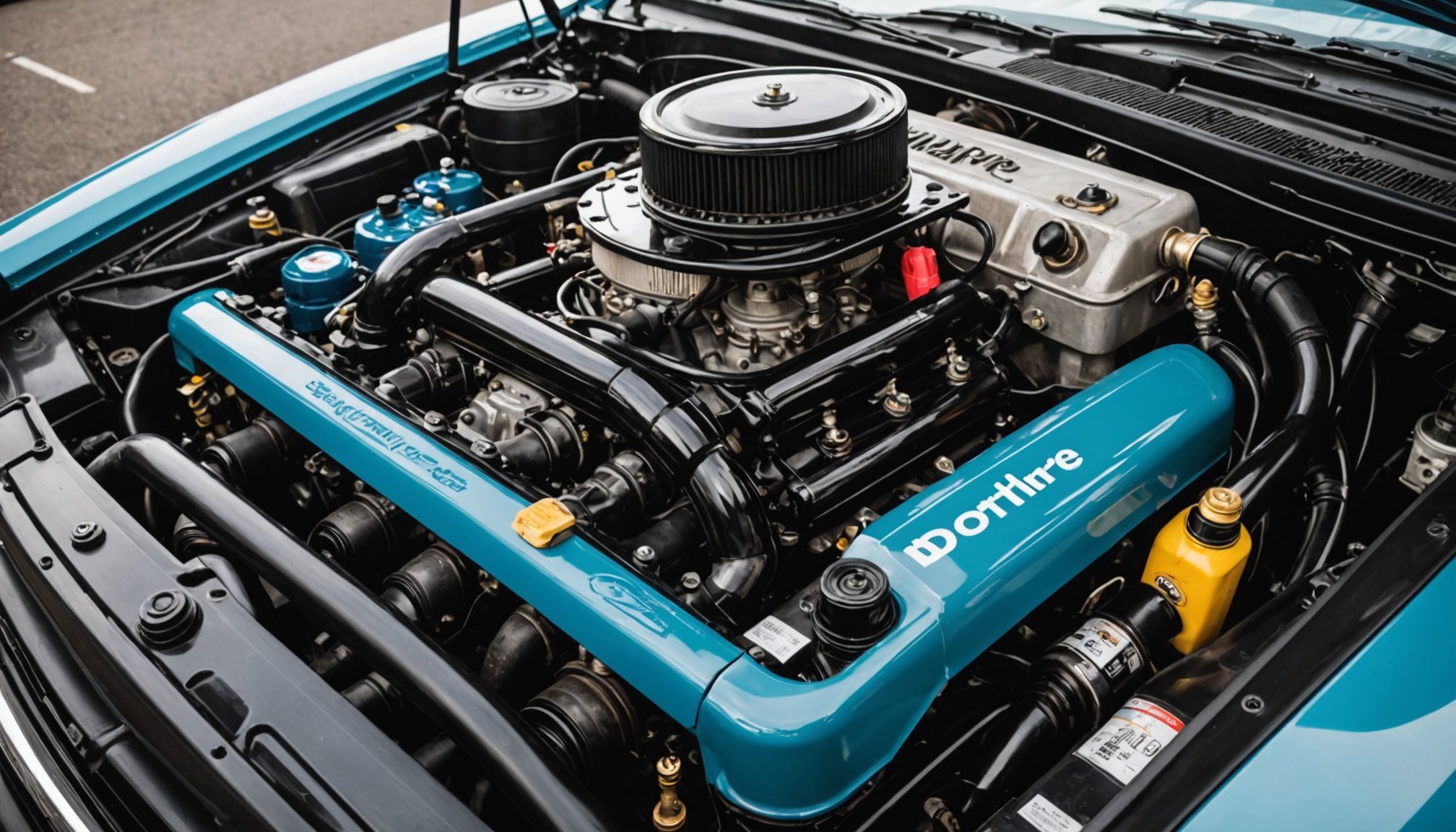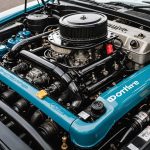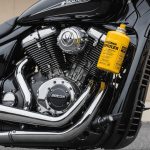Overview of Engine Oils for Heritage Cars
The importance of using specialized engine oils for heritage car engines cannot be overstated. These oils are meticulously formulated to cater to the unique needs of older engines, which can differ significantly from modern vehicles. In the UK heritage vehicles market, a variety of engine oils are available, each designed to enhance performance and longevity.
Using quality engine oils for vintage car maintenance delivers several benefits. Firstly, they offer superior protection against wear and corrosion, crucial for preserving these valuable machines. Heritage car engines often require oils with unique viscosity ratings or additives that modern oils might not provide. The correct choice ensures smoother operation and mitigates potential damage over time.
This might interest you : Unlock a smoother urban experience: the ultimate guide to selecting ideal suspension springs for your british car
Several types of engine oils tailored for UK heritage vehicles are available. Mineral oils, semi-synthetic, and fully synthetic options offer varied levels of protection and performance enhancement. Each type has its advantages, providing flexibility based on specific vehicle requirements and owner preferences.
In summary, selecting the appropriate engine oil is vital for maintaining the integrity and performance of heritage cars. The right oil can significantly impact the vehicle’s efficiency and lifespan, making selection a critical aspect of ownership.
In parallel : Elevate your british car interior: innovative lighting ideas for a distinctive atmosphere
Top Engine Oil Brands for Heritage Cars
Selecting the right engine oil brand is paramount for the optimal performance of heritage car engines. In the UK, there are numerous reputable heritage car oil options to consider.
Brand 1: Castrol Classic Oils
- Key features of Castrol Classic Oils include formulations specifically designed for vintage and classic cars.
- The oils provide excellent compatibility with popular vintage models due to their appropriate viscosity and added benefits.
- User reviews often praise their performance, noting an improvement in engine smoothness and reduced wear.
Brand 2: Millers Oils
- This brand’s unique selling points lie in its development of oils tailored for heritage engines, including low detergent levels and the inclusion of ZDDP.
- When compared to other brands, Millers show superior protection for aged components, making it a preferred choice in the community.
- Experts recommend it for its balanced formulation that meets the needs of classic engines while ensuring longevity.
Brand 3: Penrite Classic Oils
- Penrite is known for its special formulations that cater to specific requirements of older engines, utilizing high-quality base stocks.
- Performance metrics indicate a high level of protection against corrosion and sludge.
- Consumer experiences frequently highlight its ability to maintain oil pressure and cleanliness, contributing to the engine’s long-term health.
Viscosity Ratings and Their Importance
Understanding viscosity ratings is crucial when selecting engine oils for heritage car engines. Viscosity refers to an oil’s resistance to flow. It significantly affects engine performance, determining how well the oil lubricates and protects the engine’s internal parts. The correct viscosity ensures proper engine function, particularly in maintaining lubrication during temperature changes.
For UK heritage vehicles, using oils with appropriate viscosity ratings is essential. Typically, these engines require thicker oils, often denoted by higher viscosity numbers, to maintain pressure and minimize leaks. The right viscosity rating helps in reducing friction, leading to enhanced engine efficiency and longevity.
Selecting oils with recommended viscosity ratings can profoundly impact the engine’s lifespan. Oils that are too thin or thick for a specific heritage car could result in increased wear or insufficient lubrication. Thus, understanding the specific viscosity needs of your vintage vehicle is vital.
In summary, opting for the correct viscosity ratings not only protects the engine but also ensures it runs smoothly, improving both performance and longevity of heritage car engines. This decision is crucial for maintaining these cherished machines.
Maintenance Tips for Heritage Car Engines
Maintaining heritage car engines is a fine balance between tradition and technology. Regular vintage car maintenance is essential to preserve these valuable machines.
Oil change intervals should be adapted to the engine’s needs. Heritage cars often require oil changes more frequently than modern vehicles. It is crucial to check the manufacturer’s guidelines and consult a trusted mechanic for personalized advice on the best oil change schedule.
Monitoring oil quality and levels is vital. Heritage engines can be sensitive to oil degradation, which leads to inefficient lubrication. Routine checks help detect low levels or deteriorated oil, preventing damage. When inspecting oil, ensure it is clean and free of debris. Contaminated oil can cause engine wear, making it necessary to replace it promptly.
Choosing the right oil requires understanding specific heritage engine requirements. Heritage engine care tips include selecting oils with the correct additives, viscosity, and protection levels. Consult experts or vehicle forums to find trusted recommendations for your car model.
By following these practices, owners ensure their heritage vehicles remain reliable and perform optimally, honouring both historical significance and engineering prowess.
User Reviews and Experiences
The journey of finding the right engine oils for heritage car engines is often echoed in user reviews. Among the top engine oil brands, feedback highlights tangible benefits and real-world performance insights. Engine oil experiences show Castrol Classic Oils, for instance, frequently praised for improving engine smoothness and reducing wear in vintage models.
Compilation of User Feedback
User reviews reveal significant satisfaction with heritage car oil options. Common themes include enhanced lubrication and reduced engine noise, especially when using oils tailored to specific engine needs. Customers often report extended engine life and improved performance metrics as key outcomes. Many users mention the importance of following expert advice in selecting specialized oils for their UK heritage vehicles.
Expert Opinions
Automotive experts emphasize the critical role of proper oil maintenance in heritage engines. They advocate for selecting oils with suitable viscosity ratings and specialized additives. Experts often recommend brands like Millers Oils and Penrite for their high-quality formulations. These recommendations are rooted in years of experience, underscoring the long-term benefits of using appropriate engine oils. Proper oil selection is pivotal in ensuring optimal engine operation and longevity in historic vehicles.
Comparisons of Engine Oils Based on Compatibility
Choosing the right engine oil compatibility is crucial for maintaining the performance and longevity of heritage car engines. Different oils offer distinct benefits, tailored to complement various vintage car models. Selecting oils that match specific heritage car engine needs ensures smoother operations and enhanced engine efficiency.
When conducting an oil comparison, it’s vital to consider specifications such as viscosity, additives, and formulation. Brands like Castrol and Millers offer oils with different specifications, catering to the diverse requirements of older engines. Compatibility with engine parts and seals is essential to prevent leaks and ensure optimal performance.
Oil comparison also means accounting for seasonal variations and driving conditions. For instance, oils with higher viscosity ratings may be more suitable for colder climates, maintaining lubrication and pressure. It’s beneficial to compare brands on these grounds to align with your vehicle’s operational environment.
Ensuring optimal engine performance involves selecting oils that not only suit your car’s mechanical specifications but also its unique historical characteristics. Consultation with mechanics specializing in vintage vehicles or joining online forums can provide further insights into achieving the best compatibility. These considerations secure the enduring legacy of your UK heritage vehicles.
Conclusion on Selecting Engine Oils for Heritage Cars
Choosing the right engine oils for heritage car engines is crucial for maintaining their historical value and operational efficiency. When selecting, consider factors like viscosity ratings and the specific needs of your vintage vehicle. High-quality oils extend the lifespan of these cherished machines, reducing wear and tear.
An effective oil selection guide involves understanding your engine’s unique requirements and matching them to the appropriate oil type. Opt for oils designed specifically for heritage vehicles, as they offer specialized protection not found in standard oils. They maintain engine cleanliness and ensure proper lubrication, especially under varying temperature conditions.
In preserving heritage cars, consulting with knowledgeable mechanics and participating in forums can provide valuable insights. These resources aid in making informed decisions about which oils are best suited for your car’s model and condition.
Ultimately, the key to selecting the right engine oils lies in a thorough assessment of your vehicle’s needs coupled with expert advice. This approach not only safeguards the engine but also enhances vehicle performance, ensuring your heritage car continues to be a testament to automotive history.











